Nachdem wir im Laufe der Jahre Dutzende von WordPress Websites verwaltet haben, sind wir selbst mit unzähligen Spam-Kommentaren konfrontiert worden. Eine unserer effektivsten Techniken zur Spam-Bekämpfung ist das Entfernen des URL-Feldes der Website aus den Kommentar-Formularen.
Plugins für Spam in Kommentaren helfen zwar, aber viele Spammer fügen immer noch manuell Links zu Werbezwecken über das URL-Feld in Ihrem Kommentarformular ein. Wenn Sie dieses URL-Feld entfernen, können Sie Spam-Versuche erheblich reduzieren und gleichzeitig Ihren Abschnitt für Kommentare offen halten.
In diesem Artikel zeigen wir Ihnen mehrere Möglichkeiten, das URL-Feld der Website aus Ihrem WordPress-Kommentarformular zu entfernen, von einfachen Plugin-Lösungen bis hin zu einer einfachen Code-Methode.
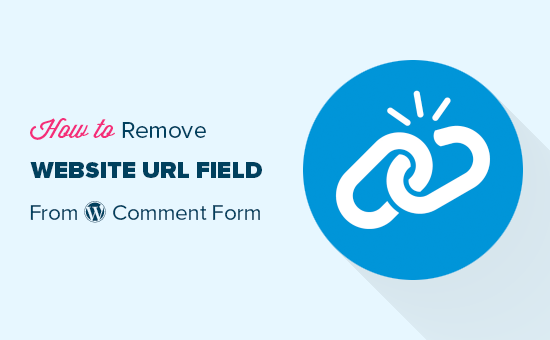
Warum reichen Leute Spam-Kommentare ein?
Da der meiste Spam von automatisierten Bots erzeugt wird, können Sie Kommentarspam mit kostenlosen Tools und Plugins leicht bekämpfen. Es ist jedoch viel schwieriger, Spam-Kommentare zu stoppen, die von Menschen eingereicht werden.
Diese Kommentare sind oft themenfremd, irrelevant und tragen nicht zur Unterhaltung bei.
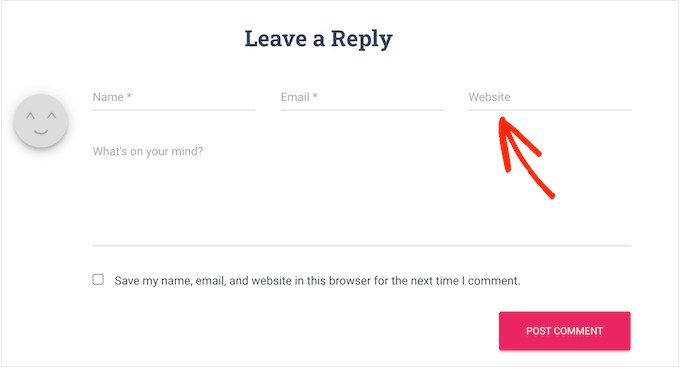
Wenn Kommentare angezeigt werden, verknüpft WordPress automatisch den Benutzernamen der Person mit der von ihr angegebenen URL der Website. Spammer können dieses Feld nutzen, um Backlinks zu erhalten oder zu versuchen, bessere Platzierungen für bestimmte Schlüsselwörter zu erzielen.
Indem Sie das Feld für die URL der Website entfernen, können Sie Spammer davon abhalten, Beiträge auf Ihrem WordPress-Blog oder Ihrer Website zu veröffentlichen. Und wie Sie in unserem WPBeginner-Kommentarformular sehen können, haben wir genau diese Funktion so deaktiviert:
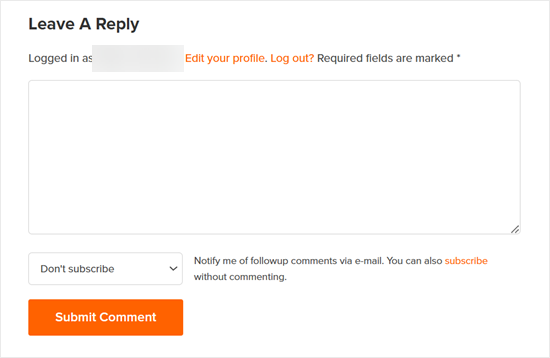
Wir tun dies, weil wir glauben, dass echte Benutzer einen Kommentar hinterlassen, unabhängig davon, ob sie einen Backlink erhalten oder nicht. Dies sollte also keinen Einfluss darauf haben, wie viele hochwertige Kommentare Sie erhalten.
Schauen wir uns also 3 verschiedene Methoden an, um das Website-Feld aus dem Kommentarformular Ihrer WordPress Website zu entfernen. Sie können die Links unten verwenden, um direkt zu der gewünschten Methode zu gelangen:
Methode 1: Website-URL-Feld mit Thrive Comments entfernen (empfohlen)
Die erste Methode verwendet Thrive Comments, das beste Plugin für Kommentare in WordPress.
Mit dem Plugin können Sie nicht nur verhindern, dass Benutzer spammige URLs einfügen, sondern auch die Beteiligung an Ihren Kommentaren erhöhen. Zum Beispiel können Sie Benutzern erlauben, Kommentare zu mögen und abzulehnen, und sie sogar zu einem relevanten Beitrag umleiten, um Ihre Seitenaufrufe zu erhöhen.
Weitere Informationen finden Sie in unserem vollständigen Bericht über Thrive Themes, in dem wir mehr über Thrive Comments berichten.
Gehen Sie zunächst auf die Website von Thrive Themes, um ein neues Konto zu erstellen und einen bezahlten Plan zu erhalten.

Nach der Anmeldung rufen Sie einfach das Dashboard Ihres Kontos auf.
Klicken Sie hier auf den Link “Plugin für Thrive Product Manager herunterladen und installieren”.
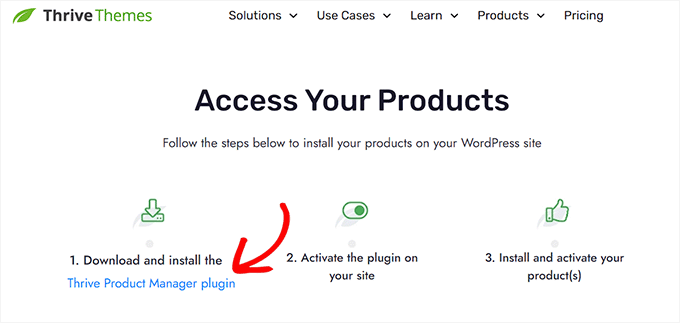
In diesem Stadium können Sie das Thrive Product Manager Plugin auf Ihrer WordPress Website installieren. Weitere Einzelheiten finden Sie in unserer Anleitung zur Installation eines WordPress Plugins.
Gehen Sie nun in Ihrem WordPress-Administrationsbereich auf die Seite Produktmanager und klicken Sie auf den Button “In mein Konto einloggen”.
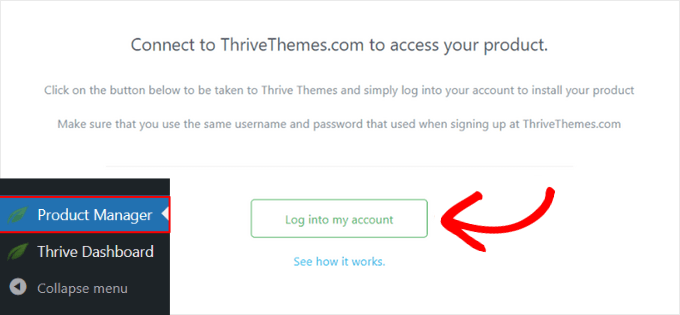
Sie sollten nun das Thrive Product Manager Dashboard sehen.
Wählen Sie hier einfach Thrive Comments aus und klicken Sie auf den Button “Ausgewählte Produkte installieren”.
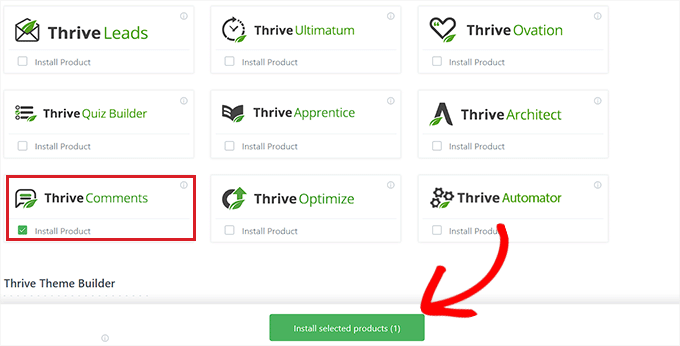
Sobald die Installation abgeschlossen ist, sollte die Erfolgsmeldung “Ready to use” erscheinen.
Klicken Sie jetzt einfach auf den Button “Zum Thrive Themes Dashboard gehen” am unteren Rand.
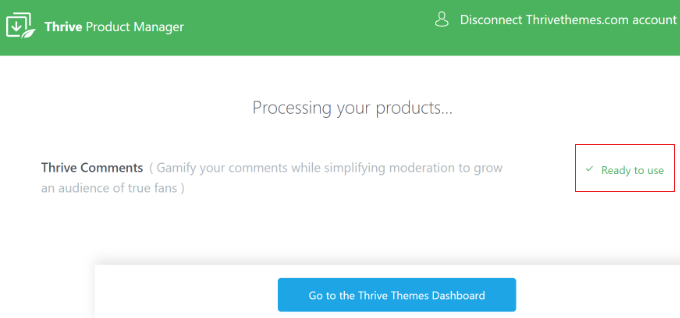
Auf der nächsten Seite sehen Sie alle Ihre installierten Plugins in der Suite.
Klicken Sie auf den Button “Thrive Comments”, um das Plugin zu verwenden.
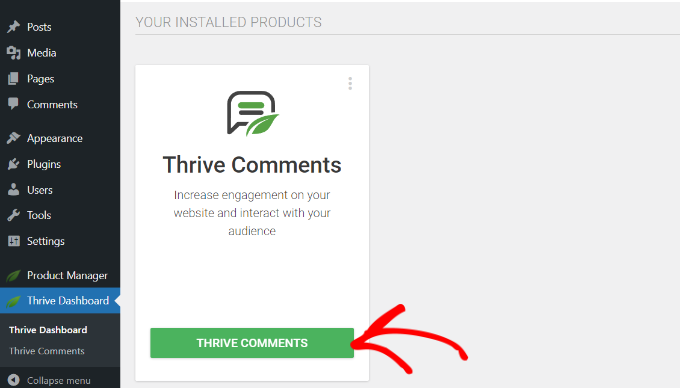
Öffnen Sie auf der Seite “Thrive Comments” das Menü “Kommentaranmeldung”.
Deaktivieren Sie dann die Einstellung “Gästen das Einfügen von URLs ihrer Websites gestatten”.
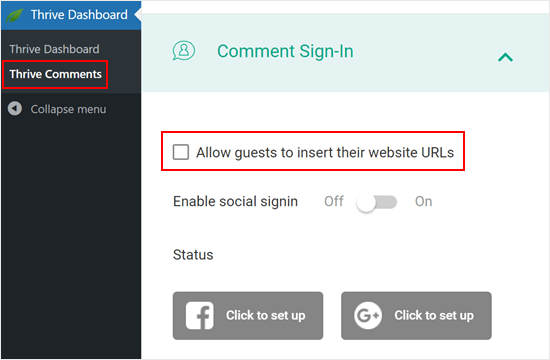
Mit dieser Option wird das URL-Feld Ihrer WordPress-Website entfernt.
Auf diese Weise bleibt Ihr Abschnitt für Kommentare frei von Spam und Ihre echten Kommentatoren werden nicht versehentlich auf bösartige Links klicken.
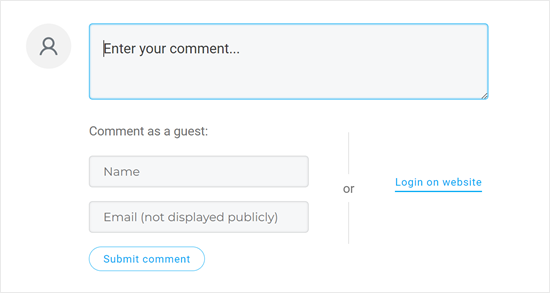
Das war’s. Wenn Sie daran interessiert sind, Thrive Comments zu nutzen, um Ihre Abschnitte für Kommentare zu verbessern, können Sie sich hier weitere Anleitungen ansehen:
- Funktionen zum Hervorheben oder Begraben von Kommentaren in WordPress
- Wie Sie Ihren Benutzern das Abonnieren von Kommentaren in WordPress ermöglichen
- Freigabe von Kommentaren durch Blog-Benutzer in WordPress
Methode 2: Website-URL-Feld mit einem kostenlosen Plugin entfernen
Wenn Sie das URL-Feld mit einem kostenlosen Plugin aus Ihrem WordPress-Kommentarformular entfernen möchten, dann schauen Sie sich Comment Link Remove und Comment Tools an.
Mit diesem Plugin können Sie das Feld entfernen und auch alle Links aus Kommentaren löschen , die Sie bereits freigegeben haben.
Zunächst müssen Sie das Plugin Comment Link Remove and Comment Tools installieren und aktivieren. Detaillierte Anweisungen finden Sie in unserer Anleitung zur Installation eines WordPress-Plugins.
Nach der Aktivierung klicken Sie im WordPress-Dashboard auf Kommentar-Werkzeuge “ Kommentar-Werkzeuge .
Aktivieren Sie hier das Kästchen neben “WEBSITE-Feld aus dem Kommentarformular entfernen”. Dies wird Spammer davon abhalten, ihre Links einzufügen.
Das heißt, dass alle Kommentare, die Sie zuvor genehmigt haben, weiterhin einen Link enthalten. Um diese URLs zu entfernen, markieren Sie einfach das Kästchen neben “Hyperlink aus Kommentar AUTHOR Bio entfernen”.
Wir empfehlen außerdem, die Einstellung ‘URLs in Kommentaren nicht in Hyperlinks umwandeln’ zu deaktivieren. Diese Option verhindert, dass URLs in Kommentaren als anklickbare Hyperlinks angezeigt werden.
Darüber hinaus können Sie optional die Option ‘HTML Link Tags in Kommentaren entfernen’ aktivieren. Mit dieser Einstellung werden die HTML-Schlagwörter entfernt, die Hyperlinks in Kommentaren erstellen. Dadurch wird sichergestellt, dass URLs oder Links in Kommentaren nicht als klickbare Links angezeigt werden.
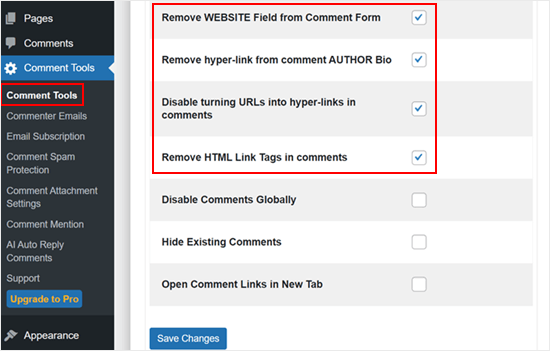
Blättern Sie dann zum Ende der Seite und klicken Sie auf den Button “Änderungen speichern”, um Ihre Einstellungen zu speichern.
Um diese Änderung in Aktion zu sehen, melden Sie sich entweder bei Ihrem Konto ab oder besuchen Sie Ihre Website in einem Inkognito-Tab.
Sie werden sehen, dass das Kommentarformular kein URL-Feld mehr hat.
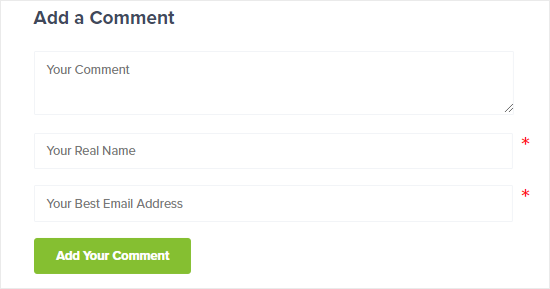
Außerdem werden die Namen der Verfasser von Kommentaren, die früher Links enthielten, nicht mehr angezeigt, und die Benutzer können nicht mehr darauf klicken.
Eines der verräterischen Anzeichen dafür ist, dass die Textfarbe des Namens des Kommentarautors, der früher Links hatte, dieselbe ist wie die des Kommentars, der keine Links hat.

Methode 3: Website-URL-Feld mit Code entfernen
Eine weitere Option besteht darin, das Website-Feld aus dem WordPress-Kommentarformular zu entfernen, indem ein Code-Snippet verwendet wird.
Der Grund, warum wir Ihnen diese Methode zeigen wollen, ist, dass das Plugin zwar das URL-Feld entfernen kann, aber das Kontrollkästchen “Meinen Namen, meine E-Mail und meine Website für den nächsten Kommentar in diesem Browser speichern” am unteren Rand beibehält.
Um die Konsistenz zu wahren, wollen wir diesen Text in “Speichere meinen Namen und meine E-Mail-Adresse in diesem Browser, wenn ich das nächste Mal einen Kommentar abgebe” ändern. Und das können wir mit benutzerdefiniertem Code tun.
In Tutorials wird oft empfohlen, individuelle Codeschnipsel in die Datei functions.php des Themes einzufügen.
Wir raten jedoch davon ab, da selbst ein kleiner Fehler in Ihrem Code zu einer Reihe von WordPress-Fehlern führen oder sogar Ihre Website komplett zerstören kann. Dieser Ansatz erfordert auch, dass Sie ein Child-Theme erstellen, damit Ihr übergeordnetes Theme nicht beeinträchtigt wird.
Anstatt all das zu tun, empfehlen wir die Verwendung von WPCode. Es ist der einfachste und sicherste Weg, um individuellen Code in WordPress hinzuzufügen, ohne die Kerndateien des Themes bearbeiten zu müssen.
Hinweis: Obwohl es ein kostenloses WPCode-Plugin gibt, werden wir für dieses Tutorial die Premium-Version verwenden.
Als Erstes müssen Sie das WPCode-Plugin auf Ihrer Website installieren und aktivieren. Weitere Einzelheiten finden Sie in unserer Schritt-für-Schritt-Anleitung für die Installation eines WordPress-Plugins.
Hinzufügen von Code zum Entfernen des URL-Feldes aus dem WordPress-Kommentarformular
Gehen Sie nach der Aktivierung zu Code Snippets “ Snippet hinzufügen.
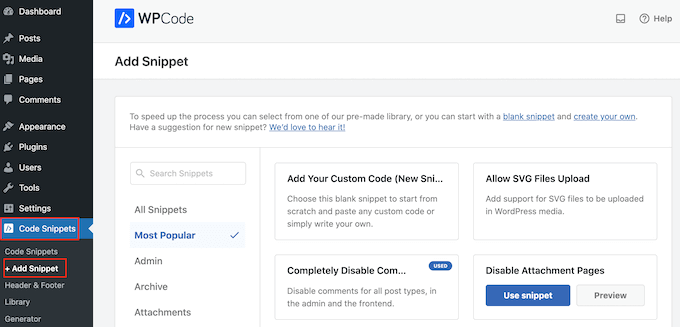
Navigieren Sie dann zur Registerkarte “Kommentare” und suchen Sie das Snippet “Disable Comment Form Website URL”.
Wenn Sie sich noch nicht mit der WPCode-Bibliothek verbunden haben, klicken Sie jetzt auf die Schaltfläche “Mit der Bibliothek verbinden, um sie freizuschalten (Free)”.
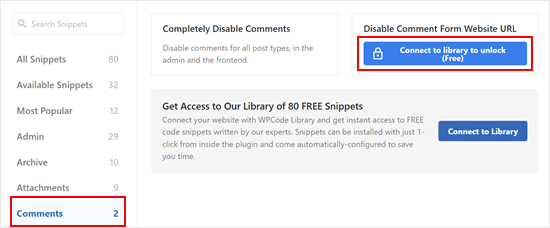
Melden Sie sich jetzt einfach bei Ihrem WPCode-Konto an.
Danach kehren Sie einfach zur vorherigen WPCode-Plugin-Seite zurück. Sie werden nun sehen, dass die Schaltfläche sich in “Snippet verwenden” geändert hat. Klicken Sie darauf, um es zu verwenden.
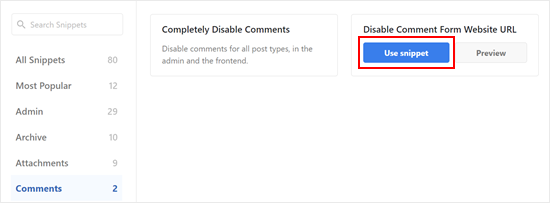
Sie sehen nun den Bildschirm des Code-Snippet-Editors mit dem Code zum Entfernen des Website-URL-Feldes aus dem Kommentarformular.
Jetzt brauchen Sie nur noch auf den Schalter “Inaktiv” zu klicken, damit er stattdessen “Aktiv” anzeigt. Klicken Sie dann auf “Aktualisieren”, um dieses Snippet zu aktivieren.
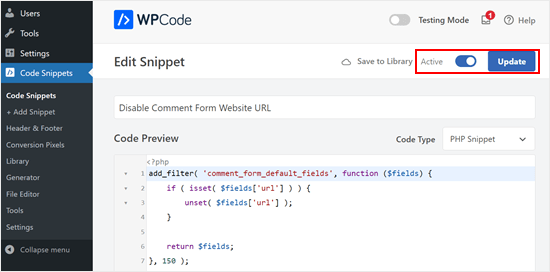
Jetzt können Besucher ihren Kommentaren keine Website-URL mehr hinzufügen.
Hinzufügen von Code zum Entfernen vorhandener Links in Kommentarautorennamen
Der Code aus dem vorigen Schritt entfernt nur das Feld für die Website-URL aus den Kommentarformularen, aber bestehende Kommentare mit verknüpften Autorennamen enthalten weiterhin Links.
Zum Glück können Sie sie mit WPCode auch leicht entfernen. Gehen Sie dazu zurück zu Code Snippets “ Snippet hinzufügen. Klicken Sie dann auf “Snippet verwenden” unter “Eigenen Code hinzufügen (neues Snippet)”.
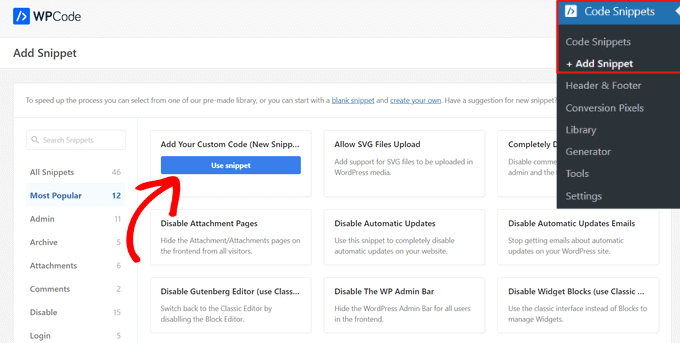
Nun können Sie diesem Codeschnipsel einen Namen geben, damit er leicht identifizierbar ist. Das kann etwas Einfaches sein wie “Hyperlinks im Namen des Kommentarautors entfernen”.
Ändern Sie anschließend den Codetyp in “PHP Snippet”.
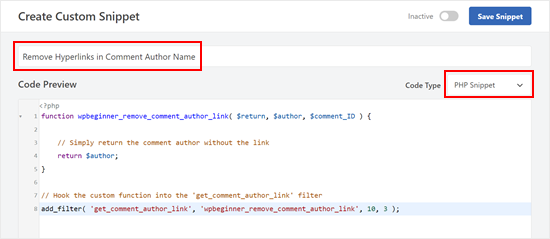
Kopieren Sie anschließend den folgenden Ausschnitt und fügen Sie ihn in die Box “Codevorschau” ein:
1 2 3 4 5 6 7 8 | function wpbeginner_remove_comment_author_link( $return, $author, $comment_ID ) { // Simply return the comment author without the link return $author;}// Hook the custom function into the 'get_comment_author_link' filteradd_filter( 'get_comment_author_link', 'wpbeginner_remove_comment_author_link', 10, 3 ); |
Scrollen Sie nach unten und vergewissern Sie sich, dass die Einfügemethode auf “Automatisch einfügen” und der Speicherort auf “Überall ausführen” eingestellt ist.
Danach müssen Sie den Code nur noch aktivieren und auf “Snippet speichern” klicken.
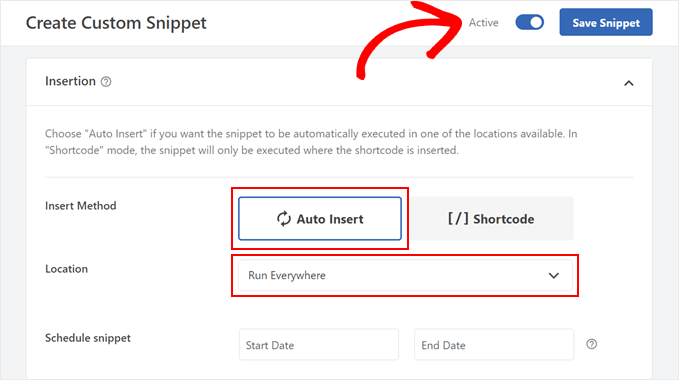
Jetzt werden Sie nicht mehr sehen, dass die älteren Namen der Kommentarautoren Links enthalten.
Hinzufügen von Code zum Ersetzen der Kommentare Cookies Opt-In Checkbox Text
Wenn Sie in Ihrem Kommentarformular das Kontrollkästchen für Cookies zum Kommentieren einblenden, sehen Sie höchstwahrscheinlich diesen Text: “Speichere meinen Namen, meine E-Mail und meine Website in diesem Browser, wenn ich das nächste Mal kommentiere.”
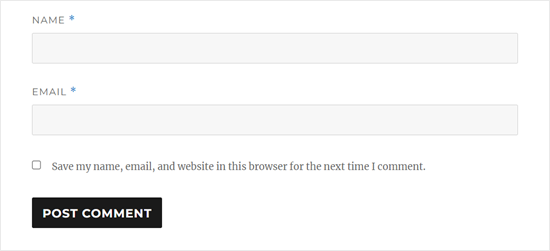
Wenn dieses Kontrollkästchen so aussieht, wenn Sie das Feld für die Website-URL nicht mehr haben, wirkt das ziemlich unbeholfen. Es ist also eine gute Idee, diesen Text zu ersetzen.
Erstellen Sie dazu einfach ein neues Snippet wie im vorherigen Schritt und wählen Sie als Codetyp “PHP Snippet”. Sie können diesen Code ‘Replace Comments Cookies Opt-In Checkbox Text’ nennen.
Kopieren Sie anschließend den unten stehenden Codeschnipsel und fügen Sie ihn in das Feld Codevorschau ein:
1 2 3 4 5 6 7 8 9 10 11 12 13 14 | // Hook a custom function 'remove_website_from_checkbox_text' into the 'gettext' filteradd_filter('gettext', 'remove_website_from_checkbox_text');function remove_website_from_checkbox_text($translated_text) { // Replace the original text with the modified text $translated_text = str_replace( 'Save my name, email, and website', // Original text to find 'Save my name and email', // Replacement text $translated_text // The text being processed ); // Return the modified translated text return $translated_text;} |
Sie können die Einstellungen für die Einfügemethode und den Speicherort wie zuvor vornehmen.
Sobald Sie das getan haben, aktivieren Sie den Code und klicken Sie auf “Snippet speichern”.
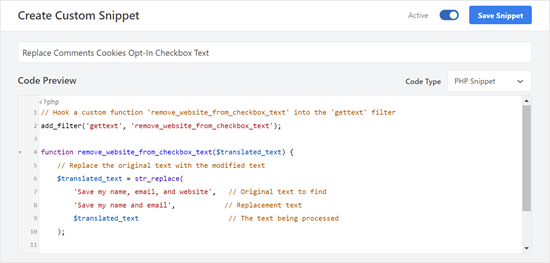
Wenn der Code erfolgreich ist, sollte der Opt-in-Text in “Speichere meinen Namen und meine E-Mail-Adresse in diesem Browser, wenn ich das nächste Mal kommentiere” geändert werden.
So sieht der Opt-in-Text auf unserer Testseite aus:
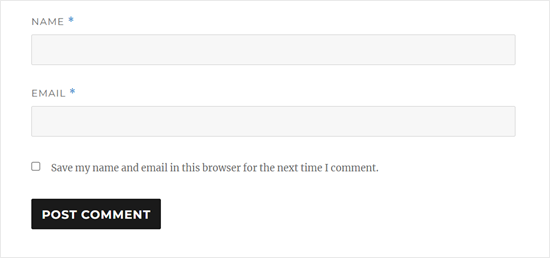
Wir hoffen, dass dieser Artikel Ihnen geholfen hat zu erfahren, wie Sie das URL-Feld der Website aus dem WordPress-Kommentarformular entfernen können. Vielleicht interessiert Sie auch unsere Anleitung für Anfänger, wie man Kommentare in WordPress moderiert, und unsere Expertenauswahl der besten Plugins für Kontaktformulare.
Wenn Ihnen dieser Artikel gefallen hat, dann abonnieren Sie bitte unseren YouTube-Kanal für WordPress-Videotutorials. Sie können uns auch auf Twitter und Facebook finden.





Leslie
I don’t know, do it with the instruction, and some websites don’t work.
WPBeginner Support
If it does not work on a site, it likely means that the theme being used is overriding the default comment form.
Admin
Dipu
Hello, thank you for creating a valuable blog post as it was a question of many about how to remove the website field from the comment form.
I want to know that if allowed the website filed, is it helpful for SEO, because they are nofollow links?
WPBeginner Support
It should not be a major factor in your site’s SEO with either choice.
Admin
Tal
Thanks the php code works great!
WPBeginner Support
Glad it was able to help you!
Admin
osama
well done, and thank you for your great work
WPBeginner Support
You’re welcome, glad you found our guide helpful!
Admin
Giri
Thank You.
I have updated, and the field has been removed.
WPBeginner Support
Glad our guide was able to help!
Admin
Anna Mildwater
Hi, this didn’t work for me (adding the code in the functions.php file) to remove the url field. I’m using a child theme for Astra, so i added it to the functions.php for that. Is that correct?
WPBeginner Support
Adding it to your child theme’s functions.php is the correct thing to do. If it didn’t remove it for you, the theme you are using may have its own method for displaying the field where you would want to check with the support for the child theme you are using and they should be able to assist!
Admin
Andres Berejnoi
Thank you for this tutorial. I have been looking for a way to remove that field for a while. It makes the comment section look more crowde, and it is just an extra step for a legitimate commenter. However, is it possible that my site will become slower if I install these kinds of plugins to solve each problem?
So far, I have not noticed the difference, but I have installed only maybe 5 besides the ones that come by default with the theme.
WPBeginner Support
It would depend on the plugin for how it would affect your site’s speed, for our opinion on plugins and how they affect your site you would want to take a look at our article below:
https://wpbeginner.com/opinion/how-many-wordpress-plugins-should-you-install-on-your-site/
Admin
Obaid
What I do is manually approve comments. Might be exhaustive for a large website, but it’s useful for beginners.
WPBeginner Support
Thanks for sharing what works for you
Admin
Arthur Morehead
The plugins have not been updated in 5 years so I’ll just use the code to remove the URL field. I am using Generate Press (child) theme and not sure if I place it before or after the ?>
Laurens
Excellent! I updated the functions file and that now hopefully gets rid of all the spammy comments on my site.
WPBeginner Support
Hopefully, it at least reduces the amount of spam
Admin
Dan
This still works in 2021.
Thanks for the code. That was easy! Glad to be rid of the website URL field for the comments.
WPBeginner Support
Glad our guide was helpful
Admin
Emmeline
Is there any way to block specific URLs from the actual comment content? When I removed the website field and hyperlink ability, it didn’t stop the spammers from just typing their website at the bottom of their comment. The default “disallowed comment keys” feature matches inside words and not just the entire URL, so I can’t block them that way either (they aren’t using distinct keywords). And of course they use a different email address every time, even though I can tell it’s the same person/group. Right now I’m deleting their comments manually, but it’s very annoying because there are so many. Any advice?
WPBeginner Support
For preventing comment spam, you would want to take a look at the recommendations in our guide below:
https://www.wpbeginner.com/beginners-guide/vital-tips-and-tools-to-combat-comment-spam-in-wordpress/
Admin
Seth
Very helpful. Couldn’t leave without saying thank you
WPBeginner Support
Glad our guide was helpful
Admin
Huzaifa Farrukh
First of all, thanks for always sharing useful tutorials like this.❤️
Secondly, I think I probably never had spend my more time on comment section instead of the article itself…
Quite a conversation going on between Syed and “commenters”
WPBeginner Support
Glad you like our tutorials and there likely is some spam that got by in the comment section if that is what you are talking about. Not everyone is perfect in terms of moderating comments.
Admin
Sharon
Thank you for this post among your other informative posts. This was very helpful. I have been receiving spam comments with website links to other websites. It didn’t help that WordPress has default “website” field for those leaving a comment. This helps. Thanks again for writing this article.
WPBeginner Support
You’re welcome, glad our guide was helpful
Admin
José Vicente Santos Aguilar
Finally I founded code that works. Thanks
WPBeginner Support
You’re welcome
Admin
mohit nagar
hello sir,
i use your tutorial to remove website option from comment.
i copy and paste the code in my functions.php but it only website field location change.
WPBeginner Support
You may want to check with your specific theme’s support to see if they could be overriding something on their end.
Admin
Sameer
Thank you Sir it’s very helpful plugin & information As well as
WPBeginner Support
You’re welcome
Admin
malika
Very informative,i liked…….
WPBeginner Support
Glad you liked our article
Admin
James Emmanuel
Thanks for this article, it was helpful… too much spams while comment section of our site was with link. we actually switched to disqus, but disqus java was too much and had some impart on site speed. with your gauide, we are again back to normal.
WPBeginner Support
Glad our guide was helpful
Admin
md somon
Very helpful post, thank you so mutch
WPBeginner Support
You’re welcome, glad our post was helpful
Admin
Rui Nogueira
Yes but is there any way to automatically erase comments that have links ? ( either bots or human typed )
WPBeginner Support
We do not have a recommended method at the moment sadly.
Admin
Dana
Thank you very much!
WPBeginner Support
You’re welcome
Admin
Will Wilson
Is it okay to delete the plugin afterward, or will the website option pop up again in the comment form?
WPBeginner Support
You would need to keep the plugin for it to keep hiding the fields
Admin
Olidur Rahman
Really very helpful thank you!
WPBeginner Support
You’re welcome, glad you found our guide helpful
Admin
hadil
thank you very nice website article
WPBeginner Support
You’re welcome, glad you like our content
Admin
pawan
Your articles always helpful for me,
All content on the website really very helpful
Thanks a lot for sharing such a helpful information
WPBeginner Support
Glad our article was helpful
Admin
Vara Prasad
Hey big fan for wpbeginner website and your code works perfectly for my disktop& mobile website can plz tell my how to remove Website URL Field from Amp pages and post please
WPBeginner Support
This code should work for the url field for comments on those pages as well
Admin
VARA PRASAD
i used code from wpbeginner website which works perfectly for the normal site but Amp pages showing Website URL field i am using newspaper theme
WPBeginner Support
You may want to reach out to your theme’s support to see if they have styling set up that could be overriding the code here
arun mishra
Great articles. i love reading this. Thnx
WPBeginner Support
Glad you enjoy our articles
Admin
JTCAD
Very detailed article. there is more in comments rather than article even.
WPBeginner Support
Glad you found our article helpful
Admin
Miracle Darlington
Well detailed article.. Learnt alot more from comments than the article itself tho.
George Conklin
I came to your website on purpose looking for a way to remove the Website/URL field on comments forms when I cannot use the functions.php method, so obviously I was looking for a plugin to do that. There doesn’t seem to be an up-to-date and reliable plugin that does this unless its baked into the functionality of another plugin. It might be a great idea to update this post just for that purpose – a working plugin
Iqbal Hussain
How to edit “Your email address will not be published. Required fields are marked *” in wordpress comment form?
Tia Mcintosh
Hey i downloaded and activated both and neither did anything to the comments box. I am just trying to get ride of the option for the comment author to put their website in.
Vishal
Hey there everyone, my theme is Twenty-Seventeen and I was able to remove the “Website URL” field from the Comment Section by just adding this single line code to “Additional CSS” section while customizing it through Appearance>Customize. The code is:
.comment-form-url {display:none;}
This might help or give you some idea I hope
WPBeginner Support
Hi Vishal,
It does not remove the comment form url field, it just hides it. Spamming bots will still be able to see and fill it.
Admin
obed
uncheck the ‘required email and website’ options in settings -> discussion on the dashboard
add the following code to your custom css
#respond .comment-form-email, #respond .comment-form-url {
display: none;
}
bill
Thank you, this has worked a bit…
Naeem Hussain
Dear is there any other way to disable website field from my ComputerPakistan Website. Actually I do not want to add any more plugin in my site.
Pravin Singh
Great article and good information. However, both the plugins mentioned have not been updated for many years and could have compatibility issues with latest versions of WordPress.
Is there an alternative plugin to disable these URLs? If yes, could you kindly update the article as it would be really useful
WPBeginner Support
If you are comfortable adding code to WordPress, then you can try this code in a site-specific plugin or your theme’s functions.php file:
functionwpb_disable_comment_url($fields){unset($fields['url']);return$fields;}add_filter('comment_form_default_fields','wpb_disable_comment_url');1-click Use in WordPress
Admin
IMRAN KHAN
I have added this code in my themes functions.php and it worked but please can you tell me how to rearrange comments section options.My website shows comments option before name and email but i want to show name and email first and then comment option.
Jazib
Hi guys
I like the article but i have concern here that plugins that you have recommended are two years old and unmaintained. Should i install it or not?
Currently i am using No Captcha service from Google via a plugin.
yellowans
hello guys
very interesting topic helped me a lot. here is my issue I deactivacted name, email and url, from my comments. now my comment section is just that comments, nothing else shows.
however the comment for still shows a space for name email and url, the url box I canceled and is not displaying anymore thanks to a plugin,
my question, which plugin (not really a fan of css) can I use to rid of name and mail on the comment entry form thank you and regards
website theme twenty thriteen
Farhan Shah
I had used a plugin “stop spam comments” for stopping spam comments. but after few week felt that I have reduced website hit on my website. my question is that comments has been stopped but why reduced website hits?
Please tell me should I remove this “Stop Spam Comments” plugin and install this plugin “Disable / Hide Comment URL”?
regards
Ciprian C.
Why not just CSS?
p.comment-form-url {height: 0 !important;overflow: hidden !important;}
not the best solution but it works for me.
WPBeginner Support
It will only make the URL field invisible, spam bots will still be able to use the URL field so it doesn’t serve the purpose.
Admin
Chris Mayell
I can corroborate that CSS changes will not suffice.
I was hoping that a simple display:none trick might work. But the messages keep coming.
I’m going to install the plugin you mentioned now.
Thanks to the author for the good suggestion & helpful article.
hassan Gul
thanx.it’s realy help me out.
Colin Crawford
Perhaps the major search engines should look into this as well. These backlinks are getting out of hand, just like when we added keywords to the meta keywords tag. That was abused and now these backlinks are getting abused.
I use a plugin called Disable Comments throughout some of my websites so no one can leave any. So far it has worked but the other websites receive on a daily basis quite a number. Reading through them, there is many adverts with lots of links, people saying how insightful your website is. For one I do not or have ever heard anyone say insightful so straight into the Spam bin.
I don’t think the amount of backlinks should influence your rankings as they can be too easy to get. I went after a web design job and the owner wanted to do some Off page SEO and wanted the successful applicant to be able to get at least 2000 backlinks for that website. Well I didn’t get the job and glad, probably spend the day leaving insightful comments on other peoples websites.
Editorial Staff
Hey Colin,
Comments definitely encourage conversations like this one here. But yes, spammers are ruining it for the webmasters. Getting rid of the link feature has definitely helped reduce spam comments on the site.
Admin
Damien
Any way to remove the comment url from comments when using Jetpack?
Editorial Staff
If the above plugin doesn’t work, then you would have to dissect the Jetpack code (that’s the only other alternative).
Admin
Jenny
Wondering if you could address a couple of concerns? For the plug-in “Disable / Hide Comment URL”
1. is only compatible to 3.2.1.
2. the last update was 2011-9-2 (really old)
Editorial Staff
If you look at the code of this plugin, it is very simple, and it works. You can take the code and dump it in your functions.php file…
functiondisable_comment_url($fields) {unset($fields['url']);return$fields;}add_filter('comment_form_default_fields','disable_comment_url');1-click Use in WordPress
So in short, no this plugin is compatible with recent versions. The author just didn’t update the plugin because it simply works. Why update when it is not broken?
Admin
Regev
Awesome!
How do I also…
1. Change the default “Your email address will not be published. Required fields are marked *” into a custom text, like you have done.
2. Remove the * from “Name” and “Email”, and change “Name” to “Your Real Name”
Thanks.
Gautam Doddamani
i guess we already had a long conversation about this a long time back…i think since you got rid of livefyre…yea i agree this helps get rid of spam users and keep legit comments comin’! real nice plugins…wil check ’em out!
Cheers,
Gautam
Shalu Sharma
Nice article and I can understand why people want to remove it but can’t you use the right plugins to moderate and control spam? Thanks for the tutorial, if I do decide to then I know where to look for it.
Cliff Beneventi
Thanks for the article. Reducing or eliminating spam is a critical part of comment management. Akismet does a great job for my clients, but uses URL’s to determine if a comment is spam. This plugin would then render Akismet less effectual. Also, the user can simply insert a URL in the comment itself, can they not? Lastly, I thought that the bulk of spam comments were generated by bots, which would still populate the comment field, even in the absence of a URL field.
Zimbrul
What crosses my mind right now is this “being WPBeginner, o e of the solid sites out there providing quality WordPress tutorials and advice, you can afford to not show the author link on your comment form”. In fact this will dicourage many to comment unless they really have something to say.
I only comment on articles that interest me and never said just “oh, great article, I’ll bookmark it, fantastic piece of writing”.
Elliott Richmond
Agreed, if someone is making the effort to comment on an article the least you can do is credit them with a link! After all it’s about the community right? I noticed this on WPB a while ago and it put me right off commenting full stop! Not that I comment for the backlink because it’s a nofollow anyway but because if any other commenters what to check me out they can.
Zimbrul
Yes, this is the idea of the author website field. But, as I said, I do mot comment here at wpbeginner for backlinks or for make myself known. I use WP Beginner website to get answers and to implement new te tehniques on sites I develop.
I only comment to topics I can “technically” comment, that’s it.
Editorial Staff
Elliot, first of all I’m sorry to hear that you have stopped commenting on WPBeginner just because we decided to get rid of the URL field. While your initial intentions weren’t to get backlinks, but your decision to stop commenting after we get rid of the field only emphasize the point.
If you do not think that a community is worth contributing to just because you are not getting a backlink/promotional value, then I don’t think that you value the community enough.
We have had internal communications about establishing a proper registration system for regular users on WPBeginner. This would allow us to unlock certain perks (i.e backlinks to all of your new and previous comments after you hit comment count marker X). But again, I feel odd because I’m offering incentives for users to comment which is favoring quantity over quality.
I will probably have this added as one of the questions in our annual survey for the WPBeginner audience.
Admin
Elliott Richmond
Not “stop commenting” or “stopped commenting” just “put off” ^_^
On the contrary I do value the community and I hope that I do offer value back to the community (albiet in a very small way compared to others) and I find your tone a little insulting to be honest!
I believe that there are other contributors who I would certainly like to find out more about but seeing as you have denied a link back to their site where I can find out about “the community” it kind of defeats the object wouldn’t you agree? Fortunately I do recognised some of the contributors who I do value, Pippin being one of them but, if I’d like to find out about others then I have no chance right?
Editorial Staff
I won’t argue semantics of stop commenting or “commenting full stop”. Nonetheless, I see your point of finding user’s information and following up with them elsewhere. One thing that can be done perhaps is hyperlink all gravatar images with the user’s gravatar profile? Would you say that is a good solution?
Always love hearing user feedback. This is why I will be adding this in the user survey that we are planning on sending out.
-Syed
Editorial Staff
Zimbrul, first of all, I really appreciate you as a user. I have your gravatar memorized because I know you are one of our regular users. This technique is not to discourage users like yourself because you add relevant and useful conversation to the articles like this comment of yours.
It is also one of the reasons why our site automatically approves your comment But you are among the exception. I can personally tell you that this is a big issue specially if you are running a tech related tutorial blog.
But you are among the exception. I can personally tell you that this is a big issue specially if you are running a tech related tutorial blog.
SmashingMagazine has the same thing. They did this long time ago, way before WPBeginner. Reason was the same. I as a user appreciated their decision of getting rid of URLs because then I could engage in meaningful conversations with real people (not those drop by’s who might add controversial comment just to get a backlink and never check back).
-Syed
Admin
Zimbrul
Syed, your kind words means more than a backlink for me, don’t you guys agree? For me the words of appreciation from one of the most respected figures in WordPress community means a lot and as I said I come here not for the backlink but for problem solving most of the time. Sometimes I need advice sometimes I can contribute.